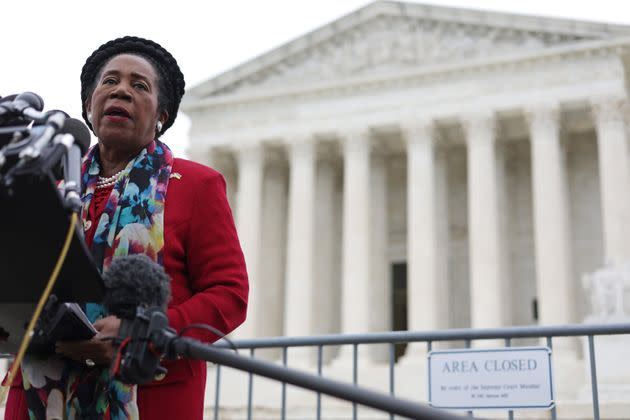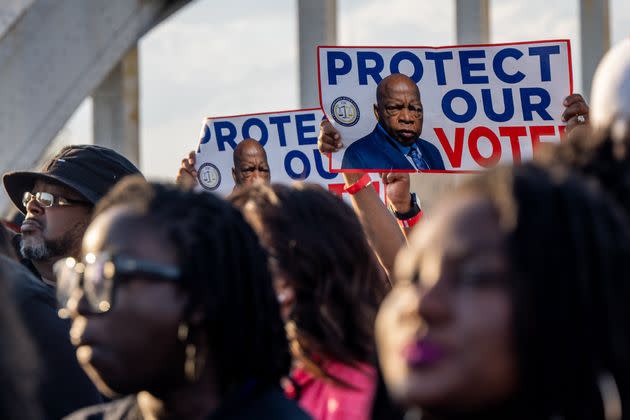Supreme Court’s Voting Rights Decision Will Help Democrats’ Chances Of Reclaiming House
The Supreme Court’s decision in Allen v. Milligan finding that Alabama violated the Voting Rights Act by diluting the votes of its Black residents should net Democrats at least one seat in the U.S. House in 2024. And it might not stop there.
The creation of a new Black-majority House seat in Alabama is a certainty, as Chief Justice John Roberts ordered in his 5-4 decision in the case. But there are at least three other cases moving through the federal judiciary at various stages challenging maps drawn by Republican legislatures that use the same, or similar, arguments as the case in Alabama.
This is almost certain to lead to at least two new Black-majority seats — but if the decision in Allen affects the outcome of all of these cases, it could lead to up to eight new majority-minority districts. This would not only increase political representation for minority communities but would dramatically improve Democrats’ chances of winning back control of the House of Representatives, as all Black-majority districts and nearly all Latino-majority districts elect Democratic representatives.
The high court’s decision is also the latest sign that redistricting is no longer a once-a-decade process generated by a new census, but an ongoing contest between two factions looking for the slightest territorial gain in the back-and-forth battle for the House. Republicans are set to make their own strikes by redrawing maps in Ohio and North Carolina, though Thursday’s ruling could limit how aggressive the GOP gets in the Tar Heel State.
The political environment for the 2024 election is still far from set, but with the GOP holding a bare five-seat majority in Congress’ lower chamber, even netting just an additional seat in Alabama could prove decisive in the close election expected by both Democrats and Republicans.
The other states where there are pending challenges brought under Section 2 of the Voting Rights Act are Louisiana, Georgia and Texas. There are also legal challenges over district maps in South Carolina and Florida that are not Section 2 challenges.

Rep. Sheila Jackson-Lee (D-Texas) speaks to members of the press after the oral argument of the Allen v. Milligan case at the Supreme Court.
“For Black voters in Alabama, Louisiana and Georgia, this decision is great news,” said Michael Li, a voting rights lawyer with the Brennan Center for Justice, a liberal nonprofit. “They all involve similar types of issues, and it’s likely Black voters will win relief in time for the 2024 election.”
Democratic groups tried not to get ahead of themselves, or outwardly excited, about the potential political implications of a case with roots in the ongoing discrimination against Southern Black voters.
“This was a textbook violation of the Voting Rights Act, and it was very clear from the outset to these voters in Alabama that their rights were being trampled,” said John Bisongano, the president of the National Democratic Redistricting Commission. “There are existing Voting Rights Act Section 2 cases in three states right now. And I imagine there could be more in the future given the clarity this ruling provides.”
Republicans tried to downplay the ruling’s political impact, with the National Republican Congressional Committee suggesting Democrats were turning to the courts to get a result they couldn’t get from voters.
“After losing their House majority by doubling down on an extreme policy agenda, Democrats’ transparent political strategy to rig the game is to ‘sue ’til it’s blue,’” said Jack Pandol, the group’s communications director. “Republicans will grow our majority in spite of Democrats’ legal end-runs around the voters who rejected their policies last November.”
Among the states, Louisiana is the most likely to be immediately affected by the court’s decision in Allen. The case out of Louisiana is almost an exact mirror of the Alabama case, involving a federal district court panel’s finding that the new district map approved by statehouse Republicans in 2021 failed to provide a second majority-Black district for the 33% of the state population that is Black. This case had already worked its way up to the Supreme Court, which kept the state’s challenged map in place in 2022 as it heard the challenge in Allen.
“I would expect the Supreme Court to send it back down to the trial court and the outcome of that will be that the court will say Louisiana needs to draw a second Black district,” Li said.
There are existing Voting Rights Act Section 2 cases in three states right now. And I imagine there could be more in the future given the clarity this ruling provides.John Bisongano, president of the National Democratic Redistricting Commission
Republicans are holding out hope that Justice Brett Kavanaugh, in particular, could feel differently about the Louisiana case. In his concurring opinion, Kavanaugh repeatedly emphasized the need for compact districts. Some proposed maps drawing a second Black-majority seat in Louisiana connect the capital of Baton Rouge to the city of Monroe in the state’s north, 180 miles away.
In Georgia, a district judge found that Republicans may have run afoul of Section 2 by not drawing enough Black-majority districts. At that time, in February 2022, the judge left the Georgia map in place because he ruled it was too close to the election to make a change, the same reason that the Alabama and Louisiana maps were kept in place. The Georgia case is set to go to trial in September.
Dave Wasserman, the House race ratings guru at the Cook Political Report, noted that Republicans could try to comply with an order for an additional Black-majority district in Georgia by packing more Black voters into Rep. Lucy McBath’s seat in the Atlanta suburbs.
And then there’s Texas. There are multiple challenges to the district map adopted by Texas Republicans in 2021, including from the Department of Justice, arguing that the state engaged in racial vote dilution of both Black and Latino residents. Among the many allegations against Texas is the accusation that Republicans drew two new white-majority seats despite 95% of the growth in the state coming from minority populations, diluting the Black and Latino vote in growing metro areas like Harris County and Dallas, and packing Latino voters in districts to prevent additional Latino-majority districts from being drawn.
The case is in the early stages and not likely to be heard until the fall, at the earliest. That means it is almost certain that the current map will remain in effect for the 2024 election. However, if this Section 2 case succeeds, it would create a major shift in power in the state and in the composition of the House going into the 2026 elections.

People march across the Edmund Pettus Bridge, the site of the 1965 march from Selma to Montgomery, Alabama, that led to the passage of the Voting Rights Act.
A more immediate but still-uncertain impact could come in North Carolina, where the state’s GOP supermajorities are set to draw new maps after a Republican-majority state Supreme Court reversed an earlier court order barring a partisan gerrymander in the state. How aggressively the GOP hopes to gerrymander the state, which is now represented by seven Democrats and seven Republicans, remains up in the air.
One Democratic operative closely watching House races says the hope is that the ruling in Allen “gives [Republicans] pause before they draw a completely insane map.”
Beyond Louisiana, Georgia and Texas, there are also challenges to GOP maps in South Carolina and Florida. In both cases, the challenges allege that the maps are violations of the 14th and 15th Amendments and do not directly raise Section 2 arguments of racial vote dilution. It is unlikely that the court’s decision in Allen will matter in these cases.
The dilution of minority voters found in Alabama and alleged in Louisiana, Georgia and Texas doesn’t just pose an opportunity for Democrats in House elections in the coming years. It also casts a pall over the current GOP House majority. If all of these vote dilution cases are successful, then it will be clear that the House majority Republicans won in 2022 was built on illegal, racially discriminatory maps.
“The GOP got a free election out of this,” Li said. “That’s a problem. These maps are clearly illegal and the court allowed them to remain in place.”

